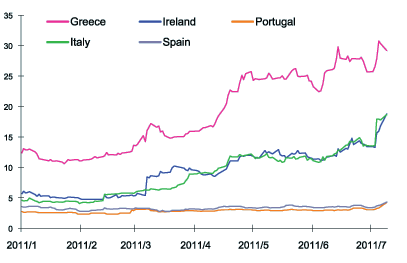Renewed Concerns on Euro Debt Crisis
As a result of its bleak economic growth and sizeable fiscal deficit, Greece has reached the point where its debt dynamics are widely estimated to be unsustainable. Currently, we do not envision Greece's bond yields could move from the current high level to those needed to stabilise debt dynamics in the near term. Without political commitments from the IMF and the EU, Greece might eventually need to restructure its debt. It is also noteworthy that the widening of bond spreads of neighbouring countries suggests that Greek debt restructuring could pose a potential systemic risk. However, we believe the contagion fears will dominate IMF and EU decisions. Revisions of the Irish and Portuguese assistance programmes are expected to be passed and the status of these countries will become clearer later. But as long as the political uncertainty persists, the trigger for renewed market tensions will remain.
PIIGS 2 Year Sovereign Yields (%)

Fed Reveals Tactics of Exit Strategy
The U.S. Federal Open Market Committee (FOMC) is preparing to return to more normal monetary policy. The April FOMC meeting discussed in detail on the tactics of the Fed's exit strategy. In line with the guidance from the FOMC minutes, we expect the exit strategy to proceed as follows: (1) cease buying treasury bills; (2) cease reinvesting in maturing mortgage-backed securities; (3) change the FOMC's "low interest rate for an extended period" statement language; (4) raise the Fed's funds rate; and (5) sell mortgage-backed securities. We expect the first interest rate movement in the U.S. to come in the second half of next year.
Hong Kong's Economy Posts Greater-than-expected Growth in First Quarter
According to the Census and Statistics Department of HKSAR Government, Hong Kong's GDP posted a stronger-than-expected expansion with a rise of 7.2% year on year in the first quarter, following 6.4% growth in the fourth quarter of 2010. Private consumption and net exports continued to provide strong support to the overall growth outlook. Investment appeared to drag after solid growth last year, though its impact is limited. We think robust growth will continue, underpinned by strong exports to the Mainland, further expansion of RMB business, loose monetary condition and support from fiscal policy. But we remain alert to the fact that the Hong Kong trade sector may see near-term distortions from the external environment, given rising energy prices and as the negative impact of Japan's earthquake to the region's supply chain starts to surface. In addition, China's economy will settle into a trend-like growth pace in the coming quarters. Overall, we have revised our forecast for Hong Kong's full-year GDP growth from 4.8% to 5.6% in 2011.
Risk Disclosure
The above information is for reference only and is not intended to provide investment advice and should not be relied upon as such. The above information is prepared on the basis of materials obtained from sources believed to be reliable but Bank of China (Hong Kong) Limited ("BOCHK") accepts no liability in relation to the use of the above information for any purposes. BOCHK does not make any representation or warranty and accepts no responsibility or liability as to the accuracy, completeness or correctness of the above information. The above information does not constitute an offer or solicitation to enter into any investment arrangement. Investment involves risk. Although investment may bring about profit opportunities, each type of investment product or service comes with its own risks. Due to the fluctuating nature of the markets, the prices of products may rise or fall beyond customers' expectations dramatically and may become valueless and customers' investment funds may increase or decrease in value as a result of selling or purchasing investment products. It is likely that losses will be incurred rather than profits made as a result of buying and selling investment products. Loss may equal or exceed the amount of the initial investment. Income yields may also fluctuate. Due to market conditions, some investments may not be readily realizable. Before making any investment decision, customers should assess their own financial position, investment objectives and experience, willingness and ability to bear risks and understand the nature and risk of the relevant product. For details of the nature of a particular product and the risk involved, please refer to the relevant offering documents. Customers should seek advice from an independent financial adviser.